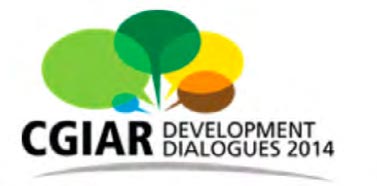 Overview of CGIAR Development Dialogues
Overview of CGIAR Development Dialogues
The inaugural CGIAR Development Dialogues will focus attention on the vital role of agriculture, forestry, fisheries, landscapes and food systems in achieving sustainable development. The one-day event will be held at the Faculty House of Columbia University in New York City on 25 September. A by-invitation-only audience of some 300 will attend. Thousands more will be included online through live webcasting and social media channels.
Background
2014 marks an historic opportunity to communicate the importance of research on sustainable agriculture to stakeholders involved in the climate change and development policy processes. In Paris in December 2015, the 21st Conference of the Parties of the UN Framework Convention on Climate Change (UNFCCC COP 21) will seek to agree on a successor to the Kyoto Protocol. In September of the same year, the UN hopes to forge a consensus and agreement on the creation of the Sustainable Development Goals (SDGs) and accompanying targets, in what UN Secretary General Ban Ki-moon has termed the post-2015 development framework and agenda. These two processes will help define the global development path of donors, civil society and policymakers in coming decades. Shaping, delivering and monitoring the targets set by these agreements will require not only new funding commitments but also the latest knowledge and innovations from the global research and academic community, in partnership with governments, civil society and the private sector.
Why CGIAR Development Dialogues?
The Dialogues present an opportunity to shape research and development for tomorrow’s food systems, landscapes and rural economy. The Dialogues are designed to influence policy and leverage the attention of world leaders, scientists, donors, media, civil society, the private sector, community groups and SDG negotiators on the vital role that agriculture, forestry, fisheries, landscapes and food systems play in sustainable development. The event offers an opportunity to forge a link between the experience of CGIAR, the Centers and CRPs and the implementation and achievement of the emerging SDGs. The event will take place in conjunction with the most important conversations on global development in recent years and will leverage the presence of key players at concurrent events.
Dialogue objectives:
- Demonstrate the fundamental role of agriculture, forestry, fisheries, landscapes and food systems for achieving each of the emerging SDGs.
- Highlight key areas of opportunities, including: improving livelihood opportunities for poor rural people; reducing risks in long-term food supply; improving nutrition; enhancing efficiency in food systems and renewable products’ value chains; investing in sustainable landscapes; conserving and wisely using biodiversity; and meeting the challenges of climate change.
- Point to important gaps in knowledge and the need for public and private investments in research, outreach and capacity development.
Intended outcomes
- Improved clarity for key decision makers on the importance of agriculture, forestry and fisheries landscapes and food systems in achieving the SDGs and climate agenda.
- Raised profile for food systems and landscapes as cross-cutting issues.
- Identification of research gaps to achieve the SDGs and targets under the climate agreement.
- Commitments to investments in research and capacity development.
- Strengthened partnerships with CGIAR.
- Identification of key recommendations for further discussion and debate, to be delivered to the UNGA.
Panel
CIMMYT and the WHEAT and MAIZE CRPs were asked to develop one of the eight panels that will take place at the Development Dialogues. Other Centers and CRPs (IRRI, ILRI, ICRISAT, the Roots, Tubers and Bananas CRP) were also invited to help develop the panel. The topic that we are developing for the event is “Global food security for 9.6 billion people in 2050: What does agricultural research (including breeding for major crops) have to do with it?”
Panel summary
After identifying key by-2050 food security and rural development challenges related to major crop farming systems, the panelists will discuss how crop production and agricultural productivity can address those challenges and translate them into agricultural research priorities. Panelists will outline the role of publicly funded international agricultural research and that of the private sector research and development in addressing those priorities. Finally, the panelists will discuss where the funding should, or could come from.
Among the key points that will be made during the panel discussion:
- Crop productivity increases (breeding and agronomy) currently do not keep pace with demand. This will lead to further food price increases.
- Food price increases will delay efforts to reduce poverty, perpetuate malnutrition and be an incentive for further deforestation.
- Demand for food will increase fastest in low- and middle-income countries.
- Most production increases will need to come from the developing world where climate change impacts will also be the greatest.
- Today’s investment in international agricultural research will determine technologies and know-how available to farmers in coming decades.
Panelists/Key Areas of Discussion
Raj Kumar, the president and editor-in-chief of Devex, will serve as the panel’s moderator. Dave Watson, manager of the MAIZE CRP, will lead the panel. Other panelists include: Timothy D. Searchinger, research scholar at the Woodrow Wilson School at Princeton University and senior fellow at the World Resources Institute; Rhoda Peace Tumusiime, African Union commissioner of Agriculture & Rural Development; and Natalie Rosenbloom, vice president of Sustainability & Signature Partnerships at Monsanto Corporation. Ashok Gulati, chair/professor of agriculture at the Indian Council for Research on International Economic Relations was also scheduled to be a panelist, but was just asked to serve on an Indian national commission that will be meeting at the same time. A substitute panelist may be added in the near-term.
 Climate adaptation and mitigation
Climate adaptation and mitigation 
